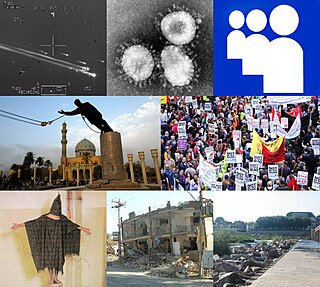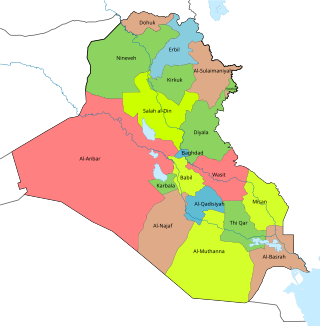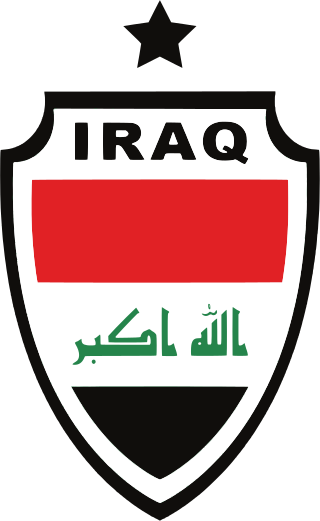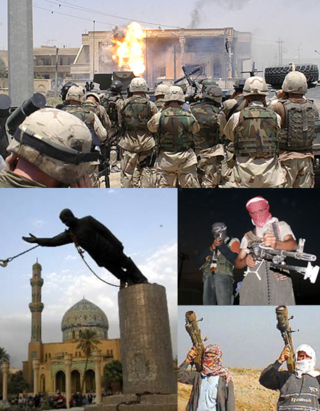
Baghdad is the capital of Iraq and the second-largest city in the Arab world after Cairo. It is located on the Tigris river. In 762 AD, Baghdad was chosen as the capital of the Abbasid Caliphate, and became its most notable major development project. Within a short time, the city evolved into a significant cultural, commercial, and intellectual center of the Muslim world. This, in addition to housing several key academic institutions, including the House of Wisdom, as well as a multiethnic and multi-religious environment, garnered it a worldwide reputation as the "Center of Learning".
Since 1980, the foreign relations of Iraq have been influenced by a number of controversial decisions by the Saddam Hussein administration. Hussein had good relations with the Soviet Union and a number of western countries such as France and Germany, who provided him with advanced weapons systems. He also developed a tenuous relation with the United States, who supported him during the Iran–Iraq War. However, the Invasion of Kuwait that triggered the Gulf War brutally changed Iraq's relations with the Arab World and the West. Egypt, Saudi Arabia, Syria and others were among the countries that supported Kuwait in the UN coalition. After the Hussein administration was toppled by the 2003 U.S. invasion, the governments that succeeded it have now tried to establish relations with various nations.

Saddam Hussein Abd al-Majid al-Tikriti was an Iraqi politician and revolutionary who served as the fifth president of Iraq from 1979 to 2003. He also served as prime minister of Iraq from 1979 to 1991 and later from 1994 to 2003. He was a leading member of the revolutionary Arab Socialist Ba'ath Party and later the Baghdad-based Ba'ath Party and its regional organization, the Iraqi Ba'ath Party, which espoused Ba'athism, a mix of Arab nationalism and Arab socialism.

2003 (MMIII) was a common year starting on Wednesday of the Gregorian calendar, the 2003rd year of the Common Era (CE) and Anno Domini (AD) designations, the 3rd year of the 3rd millennium and the 21st century, and the 4th year of the 2000s decade.

The Gulf War was an armed conflict between Iraq and a 42-country coalition led by the United States. The coalition's efforts against Iraq were carried out in two key phases: Operation Desert Shield, which marked the military buildup from August 1990 to January 1991; and Operation Desert Storm, which began with the aerial bombing campaign against Iraq on 17 January 1991 and came to a close with the American-led liberation of Kuwait on 28 February 1991.

Iraq consists of 18 recognized governorates, also known as "provinces" and 1 partially recognized governorate (Halabja). Per the Iraqi constitution, governorates can form an autonomous region. Four governorates, Erbil, Sulaymaniyah, Halabja and Duhok, constitute the autonomous Kurdistan Region. Baghdad and Basra are the oldest governorates. The second most-populous one, Ninawa is in the upland region and has a cooler climate of the north-west.

Iraqi Kurdistan or Southern Kurdistan refers to the Kurdish-populated part of northern Iraq. It is considered one of the four parts of "Kurdistan" in West Asia, which also includes parts of southeastern Turkey, northern Syria, and northwestern Iran. Much of the geographical and cultural region of Iraqi Kurdistan is part of the Kurdistan Region (KRI), an autonomous region recognized by the Constitution of Iraq. As with the rest of Kurdistan, and unlike most of the rest of Iraq, the region is inland and mountainous.

The Iraq national football team represents Iraq in international football and is controlled by the Iraq Football Association (IFA), the governing body for football in Iraq. Iraq's usual home venue is the Basra International Stadium.

The Iraqi invasion of Kuwait began on 2 August 1990 and marked the beginning of the Gulf War. After defeating the State of Kuwait on 4 August 1990, Iraq went on to militarily occupy the country for the next seven months. The invasion was condemned internationally, and the United Nations Security Council (UNSC) adopted numerous resolutions urging Iraq to withdraw from Kuwaiti territory. The Iraqi military, however, continued to occupy Kuwait and defied all orders by the UNSC. After initially establishing the "Republic of Kuwait" as a puppet state, Iraq annexed the entire country on 28 August 1990; northern Kuwait became the Saddamiyat al-Mitla' District and was merged into the existing Basra Governorate, while southern Kuwait was carved out as the all-new Kuwait Governorate. By November 1990, the adoption of UNSC Resolution 678 officially issued Iraq an ultimatum to withdraw unconditionally by 15 January 1991 or else be removed by "all necessary means" from Kuwaiti territory. In anticipation of a war with Iraq, the UNSC authorized the assembly of an American-led military coalition.

The Quds Force is one of five branches of Iran's Islamic Revolutionary Guard Corps (IRGC) specializing in unconventional warfare and military intelligence operations. U.S. Army's Iraq War General Stanley McChrystal describes the Quds Force as an organization analogous to a combination of the CIA and the Joint Special Operations Command (JSOC) in the United States. Responsible for extraterritorial operations, the Quds Force supports non-state actors in many countries, including Hezbollah, Hamas, Palestinian Islamic Jihad, Yemeni Houthis, and Shia militias in Iraq, Syria, and Afghanistan. According to Michael Wigginton and others, the Al-Quds Force is "a classic example of state-sponsored terrorism."

The Iraq War was a protracted armed conflict in Iraq from 2003 to 2011. It began with the invasion of Iraq by the United States-led coalition that overthrew the Ba'athist government of Saddam Hussein. The conflict continued for much of the next decade as an insurgency emerged to oppose the coalition forces and the post-invasion Iraqi government. US troops were officially withdrawn in 2011.

Al-Talaba Sports Club is an Iraqi professional sports club based in Al-Rusafa, Baghdad. Its football team competes in the Iraq Stars League, the top flight of Iraqi football. Founded in 1969, the club was named Al-Jamiea but became known as Al-Talaba ahead of the 1978–79 season after being merged with a new club of the same name. Their home stadium is Al-Talaba Stadium.

Iraq, officially the Republic of Iraq, is a country in West Asia and in the geopolitical region known as the Middle East. With a population of over 46 million, it is the 31st-most populous country. It is a federal parliamentary republic that consists of 19 governorates. The country is bordered by Turkey to the north, Iran to the east, the Persian Gulf and Kuwait to the southeast, Saudi Arabia to the south, Jordan to the southwest, and Syria to the west. The capital and largest city is Baghdad. The Iraqi people are diverse, with similarly diverse geography and wildlife. As part of the Arab and Muslim world, most Iraqis are Arab Muslims – minority faiths include Christianity, Yazidism, Mandaeism, Yarsanism, and Zoroastrianism. The official languages of Iraq are Arabic and Kurdish; others also recognized in specific regions are Turkish (Turkmen), Suret (Assyrian), and Armenian.

Al-Shorta Sports Club is an Iraqi sports club based in Al-Rusafa, Baghdad. It has teams in 18 different sports, and the best known section of the club is the football team, whose origins date back to 1932. Al-Shorta was established as a sports club after a clubs-only policy was introduced to Iraqi football in 1974.

The Islamic State (IS), also known as the Islamic State of Iraq and the Levant (ISIL), the Islamic State of Iraq and Syria (ISIS) and by its Arabic acronym Daesh, is a transnational Salafi jihadist group and a former unrecognised quasi-state. Its origins were in the Jai'sh al-Taifa al-Mansurah organization founded by Abu Omar al-Baghdadi in 2004, which fought alongside al-Qaeda during the Iraqi insurgency. The group gained global prominence in 2014, when its militants successfully captured large territories in northwestern Iraq and eastern Syria, taking advantage of the ongoing Syrian civil war. By the end of 2015, it ruled an area with an estimated population of twelve million people, where it enforced its extremist interpretation of Islamic law, managed an annual budget exceeding US$1 billion, and commanded more than 30,000 fighters.

The war on terror, officially the Global War on Terrorism (GWOT), is a global military campaign initiated by the United States following the September 11 attacks and is the most recent global conflict spanning multiple wars. The main targets of the campaign are militant Islamist movements like Al-Qaeda, Taliban and their allies. Other major targets included the Ba'athist regime in Iraq, which was deposed in an invasion in 2003, and various militant factions that fought during the ensuing insurgency. After its territorial expansion in 2014, the Islamic State militia has also emerged as a key adversary of the United States.

The Popular Mobilization Forces (PMF) or Al-Hashd al-Shaabi, also known as the People's Mobilization Committee (PMC) and the Popular Mobilization Units (PMU), is an Iraqi state-sponsored umbrella organization composed of approximately 67 different armed factions, with around 230,000 fighters that are mostly Shia Muslim groups, but also include Sunni Muslim, Christian, and Yazidi groups. The Popular Mobilization Units as a group was formed in 2014 and have fought in nearly every major battle against ISIL. Many of its main militias, in particular the Shias, trace their origins to the "Special Groups", Iranian-sponsored Shi'ite groups which previously fought an insurgency against the United States and the Coalition forces, as well as a sectarian conflict against Sunni Jihadist and Ba'athist insurgents. It has been called the new Iraqi Republican Guard after it was fully reorganized in early 2018 by its then–Commander in Chief Haider al-Abadi, Prime Minister of Iraq from 2014 to 2018, who issued "regulations to adapt the situation of the Popular Mobilization fighters".
Abu al-Hussein al-Husseini al-Qurashi was the fourth caliph of the Islamic State and allegedly the first Syrian to serve as caliph. He took office on 30 November 2022.
















